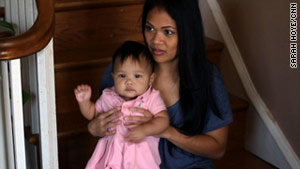Results 1 to 1 of 1
Thread Information
Users Browsing this Thread
There are currently 1 users browsing this thread. (0 members and 1 guests)
Threaded View
-
09-01-2011, 12:11 PM #1working4changeGuest
Federal deportation review comes too late for some
Federal deportation review comes too late for some

Philadelphia (CNN) -- Last September, Ana Maria Cruz waited in her minivan outside an immigration office, clutching her fiance's keys, wallet and cell phone.
Cruz, then eight months pregnant and with two of the couple's other children in tow, began to worry when Chally Dang took longer than usual to emerge from what should have been a routine check-in with immigration officials.
"I sat there for about an hour because I didn't know what to do," Cruz said. "Then he collect-called me to say they weren't letting him go."
For the next nine months, U.S. Immigration and Customs Enforcement (ICE) officials held Dang and three other Cambodian-Americans -- all legal permanent residents who had come to the United States as child refugees.
In June, they sent Dang to Cambodia. Each of the men detained last September had committed a crime that carried a retroactive removal order. That allows them to be deported at any time, regardless of when the crime was committed.
Dang, now 29, was arrested when he was 15, after he fired an illegal handgun into the air. Although no one was injured, Dang was charged in 1997 with aggravated assault, criminal conspiracy and possessing criminal instruments.
He was sentenced to 5½ years in prison. Despite having served his prison time, under 1996 immigration laws, he could be deported back to Cambodia -- a country he had never seen -- without a hearing in front of an immigration judge.
Attorneys: U.S. deportation policy shifting
Dang's situation is not uncommon, and it is becoming part of the growing debate over immigration reform in the United States.
In a move that could shake up the U.S. immigration system, the Department of Homeland Security said the government would review about 300,000 deportation cases pending in federal immigration courts.
Lower-priority cases -- those not involving people considered violent or otherwise dangerous -- would be suspended under the new criteria.
Federal authorities are still hashing out details of how the cases will be reviewed, a senior Department of Homeland Security official said last week.
Immigration reform: Why now?
For Cruz and Dang, the announcement comes too late for them to tell their story.

http://www.cnn.com/2011/US/09/01/philad ... =allsearch


 LinkBack URL
LinkBack URL About LinkBacks
About LinkBacks


 Reply With Quote
Reply With Quote

'Poster Boy' Migrant Imprisoned After Beating And Raping His Own...
05-20-2024, 12:21 PM in illegal immigration News Stories & Reports